ICT Project Management Report: Methodologies and Comparisons
VerifiedAdded on 2021/04/21
|7
|1536
|54
Report
AI Summary
This report provides a comprehensive overview of ICT project management, focusing on project methodologies and their applications. It begins by defining project methodology and its importance in achieving project objectives, emphasizing the significance of budget and schedule management. The report then delves into the similarities and dissimilarities between PMBOK and Agile XP methodologies, highlighting their modern project management approaches, outputs, and differences in risk management, guidelines, and communication strategies. Furthermore, the report relates Agile XP to the project life cycle, discussing its role in software development, early delivery, and adaptive planning. References to key project management literature are also included. The report aims to provide a clear understanding of project management methodologies for effective project execution.
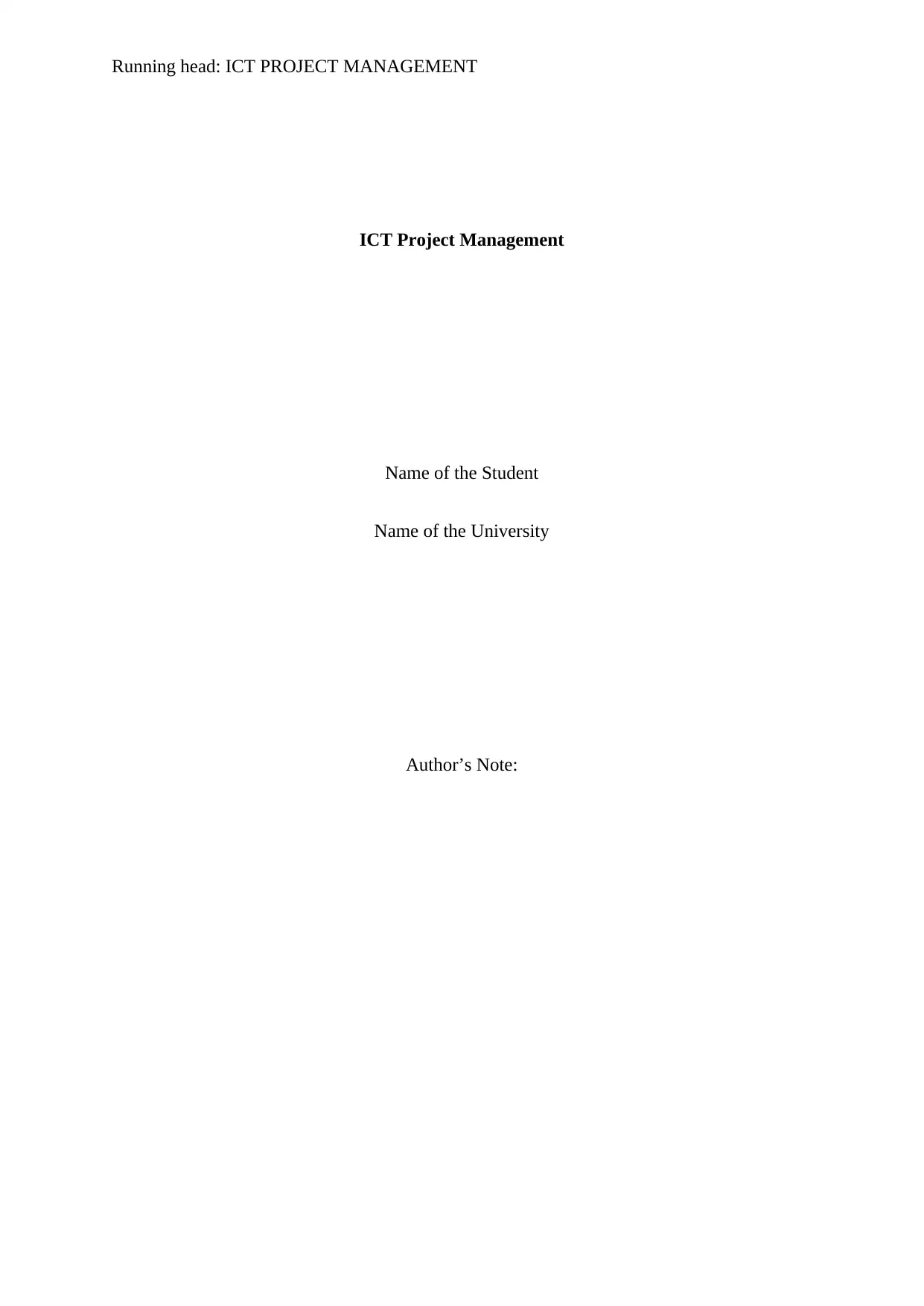
Running head: ICT PROJECT MANAGEMENT
ICT Project Management
Name of the Student
Name of the University
Author’s Note:
ICT Project Management
Name of the Student
Name of the University
Author’s Note:
Paraphrase This Document
Need a fresh take? Get an instant paraphrase of this document with our AI Paraphraser
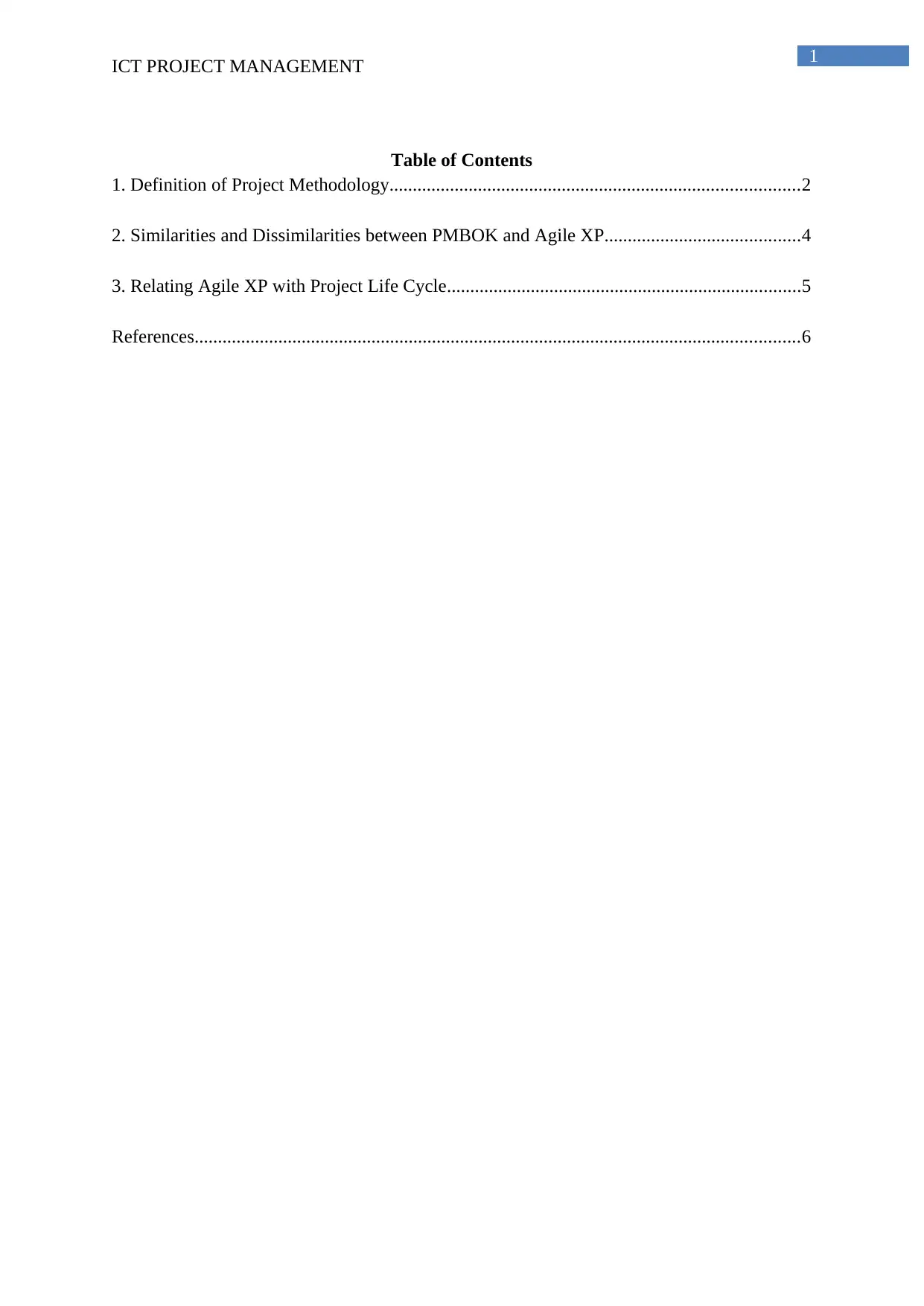
1
ICT PROJECT MANAGEMENT
Table of Contents
1. Definition of Project Methodology........................................................................................2
2. Similarities and Dissimilarities between PMBOK and Agile XP..........................................4
3. Relating Agile XP with Project Life Cycle............................................................................5
References..................................................................................................................................6
ICT PROJECT MANAGEMENT
Table of Contents
1. Definition of Project Methodology........................................................................................2
2. Similarities and Dissimilarities between PMBOK and Agile XP..........................................4
3. Relating Agile XP with Project Life Cycle............................................................................5
References..................................................................................................................................6
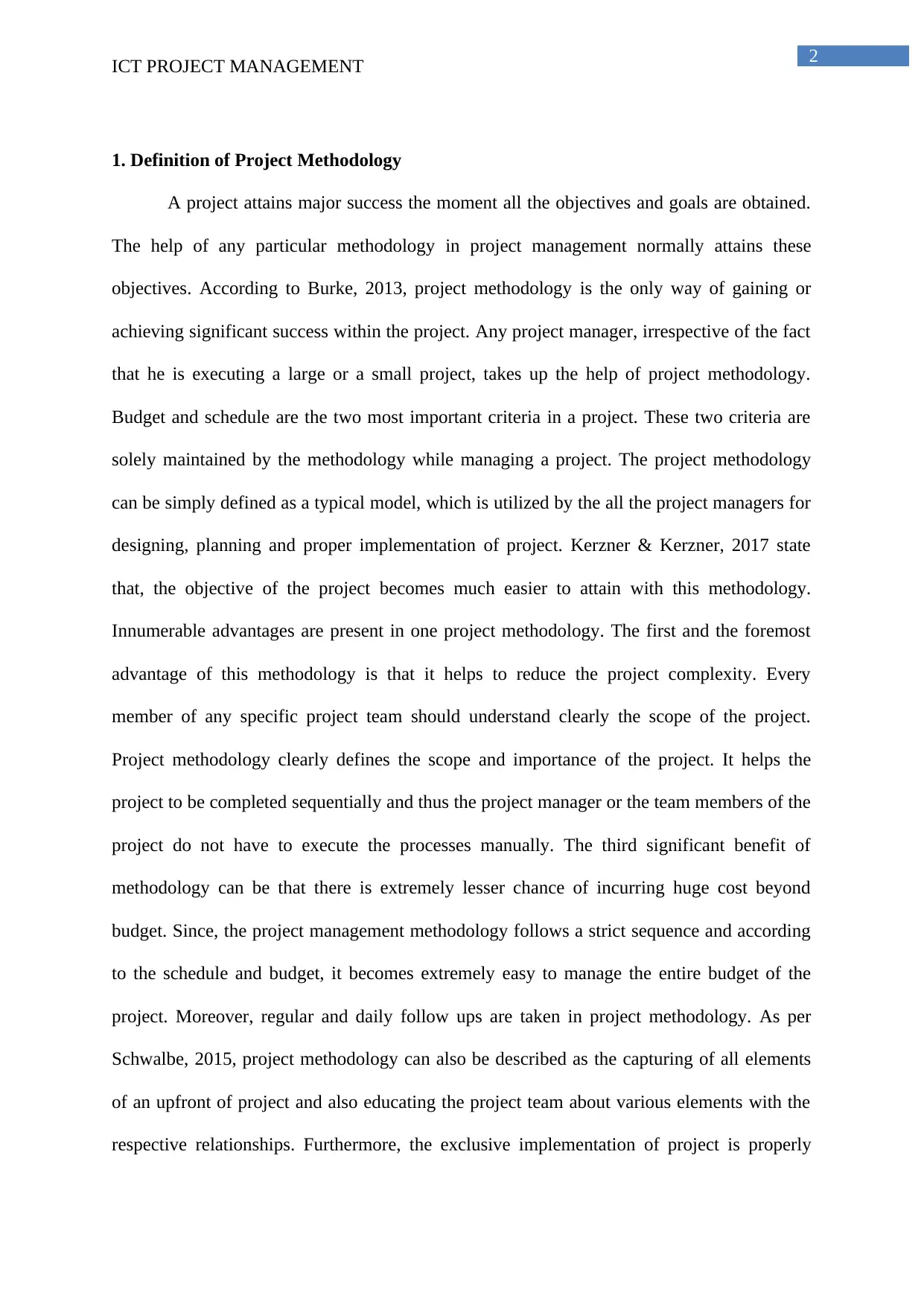
2
ICT PROJECT MANAGEMENT
1. Definition of Project Methodology
A project attains major success the moment all the objectives and goals are obtained.
The help of any particular methodology in project management normally attains these
objectives. According to Burke, 2013, project methodology is the only way of gaining or
achieving significant success within the project. Any project manager, irrespective of the fact
that he is executing a large or a small project, takes up the help of project methodology.
Budget and schedule are the two most important criteria in a project. These two criteria are
solely maintained by the methodology while managing a project. The project methodology
can be simply defined as a typical model, which is utilized by the all the project managers for
designing, planning and proper implementation of project. Kerzner & Kerzner, 2017 state
that, the objective of the project becomes much easier to attain with this methodology.
Innumerable advantages are present in one project methodology. The first and the foremost
advantage of this methodology is that it helps to reduce the project complexity. Every
member of any specific project team should understand clearly the scope of the project.
Project methodology clearly defines the scope and importance of the project. It helps the
project to be completed sequentially and thus the project manager or the team members of the
project do not have to execute the processes manually. The third significant benefit of
methodology can be that there is extremely lesser chance of incurring huge cost beyond
budget. Since, the project management methodology follows a strict sequence and according
to the schedule and budget, it becomes extremely easy to manage the entire budget of the
project. Moreover, regular and daily follow ups are taken in project methodology. As per
Schwalbe, 2015, project methodology can also be described as the capturing of all elements
of an upfront of project and also educating the project team about various elements with the
respective relationships. Furthermore, the exclusive implementation of project is properly
ICT PROJECT MANAGEMENT
1. Definition of Project Methodology
A project attains major success the moment all the objectives and goals are obtained.
The help of any particular methodology in project management normally attains these
objectives. According to Burke, 2013, project methodology is the only way of gaining or
achieving significant success within the project. Any project manager, irrespective of the fact
that he is executing a large or a small project, takes up the help of project methodology.
Budget and schedule are the two most important criteria in a project. These two criteria are
solely maintained by the methodology while managing a project. The project methodology
can be simply defined as a typical model, which is utilized by the all the project managers for
designing, planning and proper implementation of project. Kerzner & Kerzner, 2017 state
that, the objective of the project becomes much easier to attain with this methodology.
Innumerable advantages are present in one project methodology. The first and the foremost
advantage of this methodology is that it helps to reduce the project complexity. Every
member of any specific project team should understand clearly the scope of the project.
Project methodology clearly defines the scope and importance of the project. It helps the
project to be completed sequentially and thus the project manager or the team members of the
project do not have to execute the processes manually. The third significant benefit of
methodology can be that there is extremely lesser chance of incurring huge cost beyond
budget. Since, the project management methodology follows a strict sequence and according
to the schedule and budget, it becomes extremely easy to manage the entire budget of the
project. Moreover, regular and daily follow ups are taken in project methodology. As per
Schwalbe, 2015, project methodology can also be described as the capturing of all elements
of an upfront of project and also educating the project team about various elements with the
respective relationships. Furthermore, the exclusive implementation of project is properly
⊘ This is a preview!⊘
Do you want full access?
Subscribe today to unlock all pages.

Trusted by 1+ million students worldwide
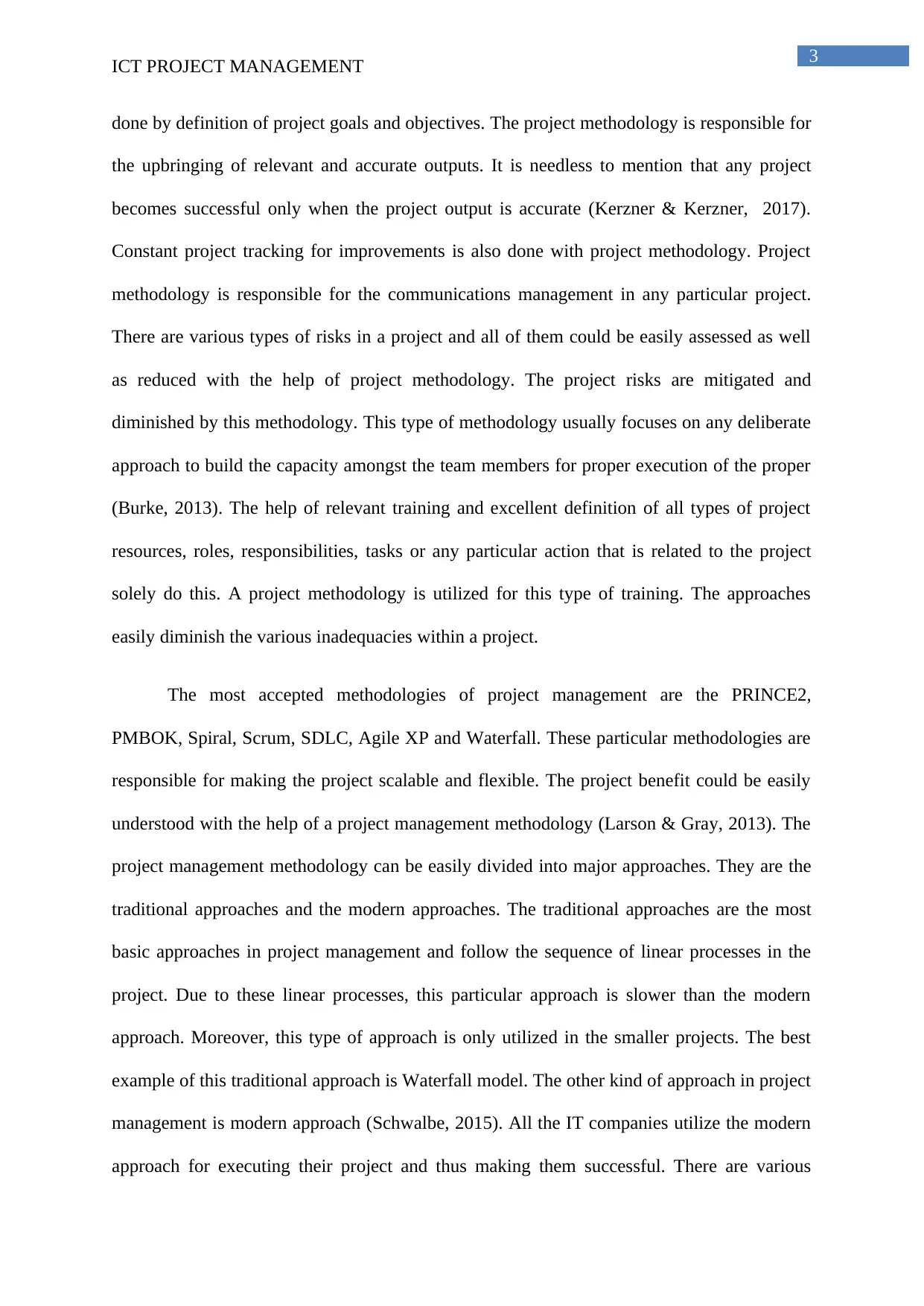
3
ICT PROJECT MANAGEMENT
done by definition of project goals and objectives. The project methodology is responsible for
the upbringing of relevant and accurate outputs. It is needless to mention that any project
becomes successful only when the project output is accurate (Kerzner & Kerzner, 2017).
Constant project tracking for improvements is also done with project methodology. Project
methodology is responsible for the communications management in any particular project.
There are various types of risks in a project and all of them could be easily assessed as well
as reduced with the help of project methodology. The project risks are mitigated and
diminished by this methodology. This type of methodology usually focuses on any deliberate
approach to build the capacity amongst the team members for proper execution of the proper
(Burke, 2013). The help of relevant training and excellent definition of all types of project
resources, roles, responsibilities, tasks or any particular action that is related to the project
solely do this. A project methodology is utilized for this type of training. The approaches
easily diminish the various inadequacies within a project.
The most accepted methodologies of project management are the PRINCE2,
PMBOK, Spiral, Scrum, SDLC, Agile XP and Waterfall. These particular methodologies are
responsible for making the project scalable and flexible. The project benefit could be easily
understood with the help of a project management methodology (Larson & Gray, 2013). The
project management methodology can be easily divided into major approaches. They are the
traditional approaches and the modern approaches. The traditional approaches are the most
basic approaches in project management and follow the sequence of linear processes in the
project. Due to these linear processes, this particular approach is slower than the modern
approach. Moreover, this type of approach is only utilized in the smaller projects. The best
example of this traditional approach is Waterfall model. The other kind of approach in project
management is modern approach (Schwalbe, 2015). All the IT companies utilize the modern
approach for executing their project and thus making them successful. There are various
ICT PROJECT MANAGEMENT
done by definition of project goals and objectives. The project methodology is responsible for
the upbringing of relevant and accurate outputs. It is needless to mention that any project
becomes successful only when the project output is accurate (Kerzner & Kerzner, 2017).
Constant project tracking for improvements is also done with project methodology. Project
methodology is responsible for the communications management in any particular project.
There are various types of risks in a project and all of them could be easily assessed as well
as reduced with the help of project methodology. The project risks are mitigated and
diminished by this methodology. This type of methodology usually focuses on any deliberate
approach to build the capacity amongst the team members for proper execution of the proper
(Burke, 2013). The help of relevant training and excellent definition of all types of project
resources, roles, responsibilities, tasks or any particular action that is related to the project
solely do this. A project methodology is utilized for this type of training. The approaches
easily diminish the various inadequacies within a project.
The most accepted methodologies of project management are the PRINCE2,
PMBOK, Spiral, Scrum, SDLC, Agile XP and Waterfall. These particular methodologies are
responsible for making the project scalable and flexible. The project benefit could be easily
understood with the help of a project management methodology (Larson & Gray, 2013). The
project management methodology can be easily divided into major approaches. They are the
traditional approaches and the modern approaches. The traditional approaches are the most
basic approaches in project management and follow the sequence of linear processes in the
project. Due to these linear processes, this particular approach is slower than the modern
approach. Moreover, this type of approach is only utilized in the smaller projects. The best
example of this traditional approach is Waterfall model. The other kind of approach in project
management is modern approach (Schwalbe, 2015). All the IT companies utilize the modern
approach for executing their project and thus making them successful. There are various
Paraphrase This Document
Need a fresh take? Get an instant paraphrase of this document with our AI Paraphraser
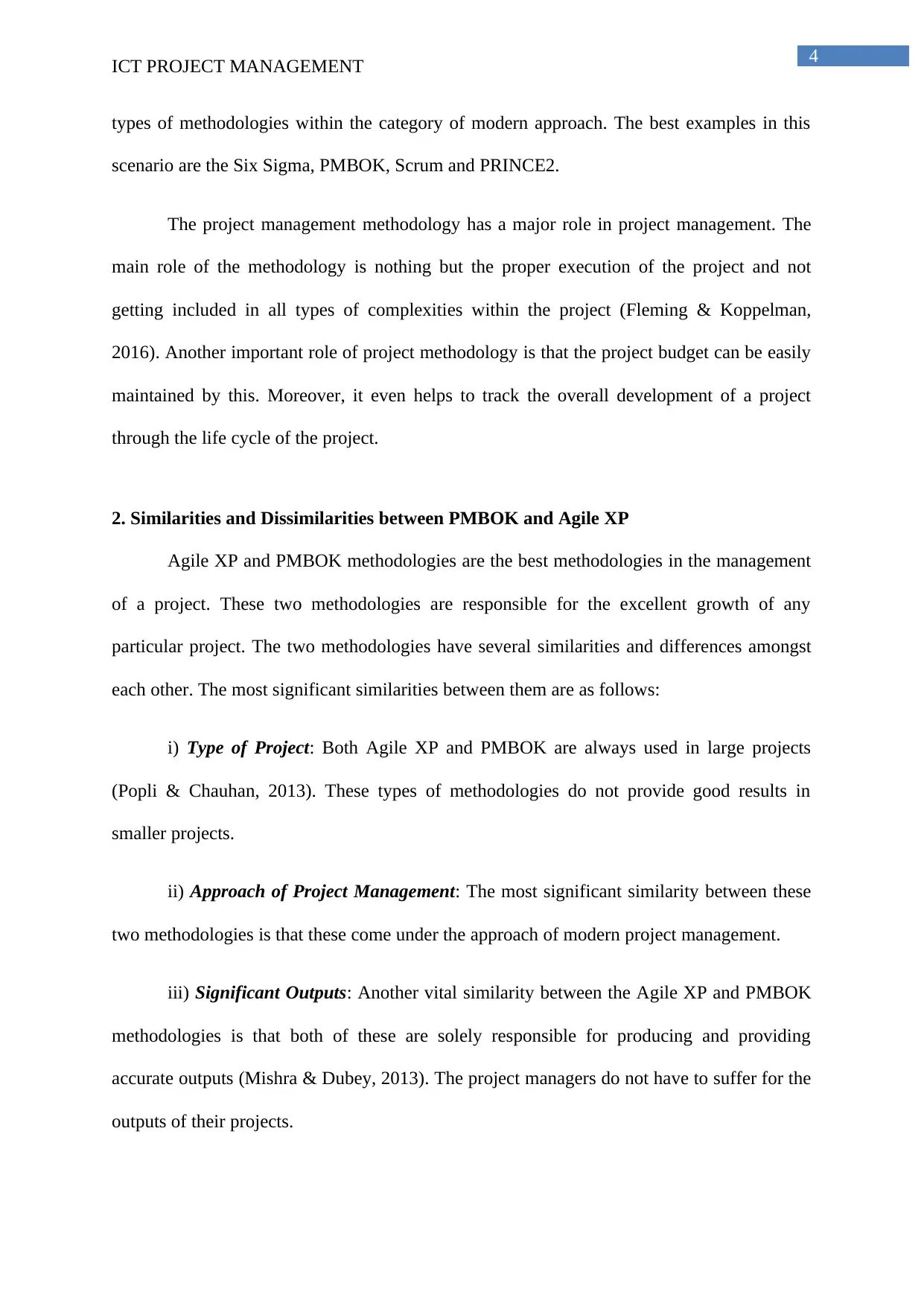
4
ICT PROJECT MANAGEMENT
types of methodologies within the category of modern approach. The best examples in this
scenario are the Six Sigma, PMBOK, Scrum and PRINCE2.
The project management methodology has a major role in project management. The
main role of the methodology is nothing but the proper execution of the project and not
getting included in all types of complexities within the project (Fleming & Koppelman,
2016). Another important role of project methodology is that the project budget can be easily
maintained by this. Moreover, it even helps to track the overall development of a project
through the life cycle of the project.
2. Similarities and Dissimilarities between PMBOK and Agile XP
Agile XP and PMBOK methodologies are the best methodologies in the management
of a project. These two methodologies are responsible for the excellent growth of any
particular project. The two methodologies have several similarities and differences amongst
each other. The most significant similarities between them are as follows:
i) Type of Project: Both Agile XP and PMBOK are always used in large projects
(Popli & Chauhan, 2013). These types of methodologies do not provide good results in
smaller projects.
ii) Approach of Project Management: The most significant similarity between these
two methodologies is that these come under the approach of modern project management.
iii) Significant Outputs: Another vital similarity between the Agile XP and PMBOK
methodologies is that both of these are solely responsible for producing and providing
accurate outputs (Mishra & Dubey, 2013). The project managers do not have to suffer for the
outputs of their projects.
ICT PROJECT MANAGEMENT
types of methodologies within the category of modern approach. The best examples in this
scenario are the Six Sigma, PMBOK, Scrum and PRINCE2.
The project management methodology has a major role in project management. The
main role of the methodology is nothing but the proper execution of the project and not
getting included in all types of complexities within the project (Fleming & Koppelman,
2016). Another important role of project methodology is that the project budget can be easily
maintained by this. Moreover, it even helps to track the overall development of a project
through the life cycle of the project.
2. Similarities and Dissimilarities between PMBOK and Agile XP
Agile XP and PMBOK methodologies are the best methodologies in the management
of a project. These two methodologies are responsible for the excellent growth of any
particular project. The two methodologies have several similarities and differences amongst
each other. The most significant similarities between them are as follows:
i) Type of Project: Both Agile XP and PMBOK are always used in large projects
(Popli & Chauhan, 2013). These types of methodologies do not provide good results in
smaller projects.
ii) Approach of Project Management: The most significant similarity between these
two methodologies is that these come under the approach of modern project management.
iii) Significant Outputs: Another vital similarity between the Agile XP and PMBOK
methodologies is that both of these are solely responsible for producing and providing
accurate outputs (Mishra & Dubey, 2013). The project managers do not have to suffer for the
outputs of their projects.
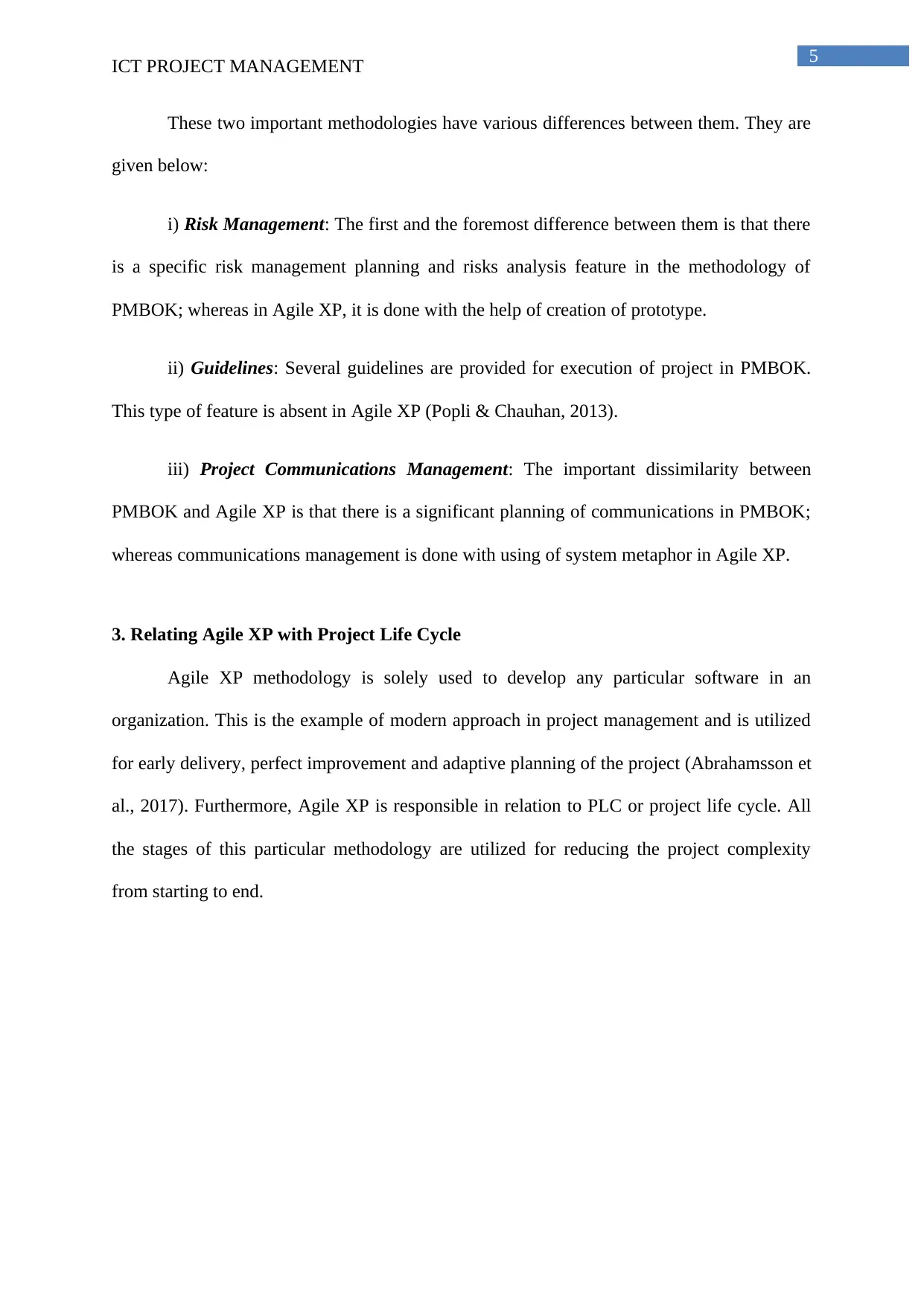
5
ICT PROJECT MANAGEMENT
These two important methodologies have various differences between them. They are
given below:
i) Risk Management: The first and the foremost difference between them is that there
is a specific risk management planning and risks analysis feature in the methodology of
PMBOK; whereas in Agile XP, it is done with the help of creation of prototype.
ii) Guidelines: Several guidelines are provided for execution of project in PMBOK.
This type of feature is absent in Agile XP (Popli & Chauhan, 2013).
iii) Project Communications Management: The important dissimilarity between
PMBOK and Agile XP is that there is a significant planning of communications in PMBOK;
whereas communications management is done with using of system metaphor in Agile XP.
3. Relating Agile XP with Project Life Cycle
Agile XP methodology is solely used to develop any particular software in an
organization. This is the example of modern approach in project management and is utilized
for early delivery, perfect improvement and adaptive planning of the project (Abrahamsson et
al., 2017). Furthermore, Agile XP is responsible in relation to PLC or project life cycle. All
the stages of this particular methodology are utilized for reducing the project complexity
from starting to end.
ICT PROJECT MANAGEMENT
These two important methodologies have various differences between them. They are
given below:
i) Risk Management: The first and the foremost difference between them is that there
is a specific risk management planning and risks analysis feature in the methodology of
PMBOK; whereas in Agile XP, it is done with the help of creation of prototype.
ii) Guidelines: Several guidelines are provided for execution of project in PMBOK.
This type of feature is absent in Agile XP (Popli & Chauhan, 2013).
iii) Project Communications Management: The important dissimilarity between
PMBOK and Agile XP is that there is a significant planning of communications in PMBOK;
whereas communications management is done with using of system metaphor in Agile XP.
3. Relating Agile XP with Project Life Cycle
Agile XP methodology is solely used to develop any particular software in an
organization. This is the example of modern approach in project management and is utilized
for early delivery, perfect improvement and adaptive planning of the project (Abrahamsson et
al., 2017). Furthermore, Agile XP is responsible in relation to PLC or project life cycle. All
the stages of this particular methodology are utilized for reducing the project complexity
from starting to end.
⊘ This is a preview!⊘
Do you want full access?
Subscribe today to unlock all pages.

Trusted by 1+ million students worldwide
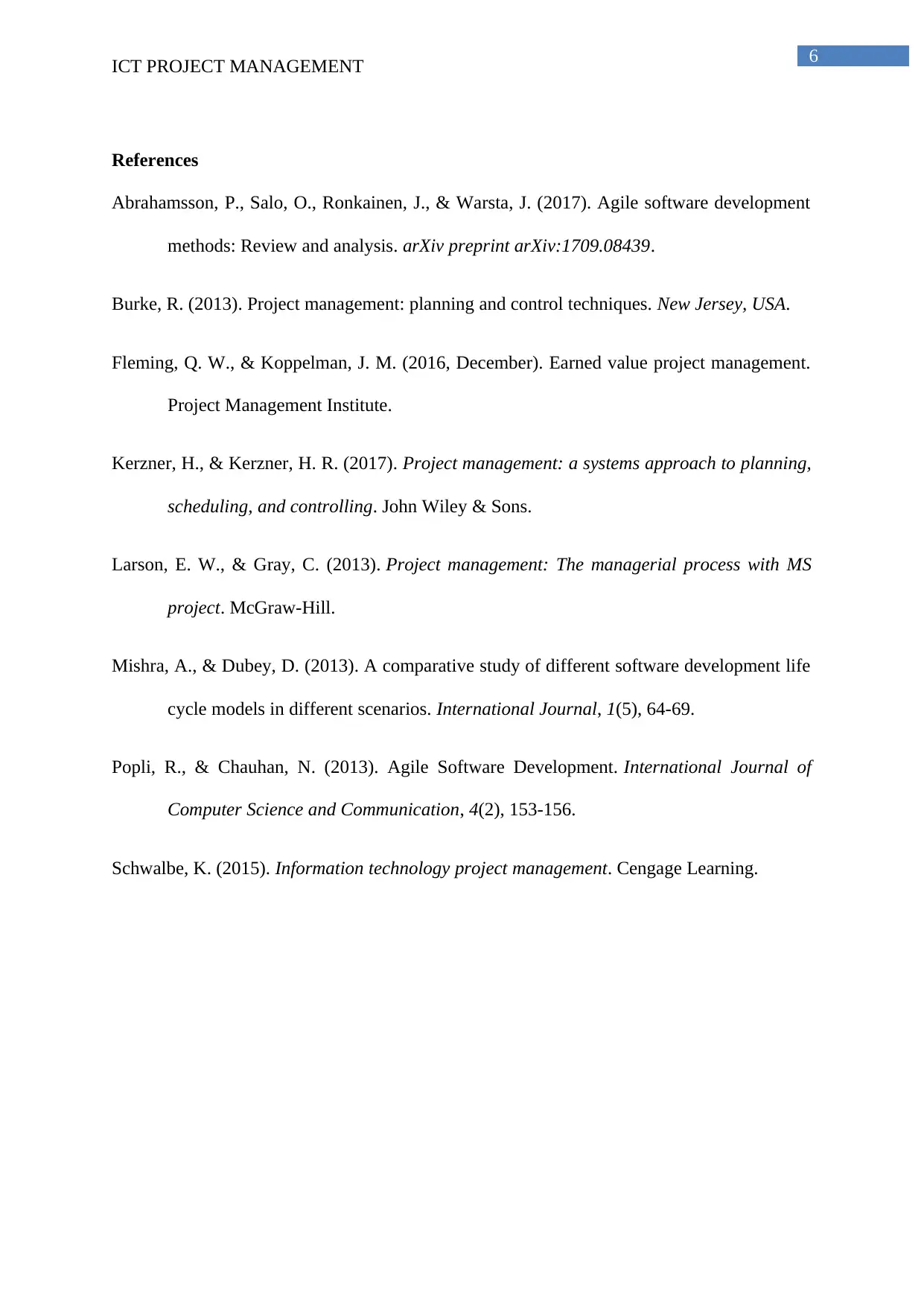
6
ICT PROJECT MANAGEMENT
References
Abrahamsson, P., Salo, O., Ronkainen, J., & Warsta, J. (2017). Agile software development
methods: Review and analysis. arXiv preprint arXiv:1709.08439.
Burke, R. (2013). Project management: planning and control techniques. New Jersey, USA.
Fleming, Q. W., & Koppelman, J. M. (2016, December). Earned value project management.
Project Management Institute.
Kerzner, H., & Kerzner, H. R. (2017). Project management: a systems approach to planning,
scheduling, and controlling. John Wiley & Sons.
Larson, E. W., & Gray, C. (2013). Project management: The managerial process with MS
project. McGraw-Hill.
Mishra, A., & Dubey, D. (2013). A comparative study of different software development life
cycle models in different scenarios. International Journal, 1(5), 64-69.
Popli, R., & Chauhan, N. (2013). Agile Software Development. International Journal of
Computer Science and Communication, 4(2), 153-156.
Schwalbe, K. (2015). Information technology project management. Cengage Learning.
ICT PROJECT MANAGEMENT
References
Abrahamsson, P., Salo, O., Ronkainen, J., & Warsta, J. (2017). Agile software development
methods: Review and analysis. arXiv preprint arXiv:1709.08439.
Burke, R. (2013). Project management: planning and control techniques. New Jersey, USA.
Fleming, Q. W., & Koppelman, J. M. (2016, December). Earned value project management.
Project Management Institute.
Kerzner, H., & Kerzner, H. R. (2017). Project management: a systems approach to planning,
scheduling, and controlling. John Wiley & Sons.
Larson, E. W., & Gray, C. (2013). Project management: The managerial process with MS
project. McGraw-Hill.
Mishra, A., & Dubey, D. (2013). A comparative study of different software development life
cycle models in different scenarios. International Journal, 1(5), 64-69.
Popli, R., & Chauhan, N. (2013). Agile Software Development. International Journal of
Computer Science and Communication, 4(2), 153-156.
Schwalbe, K. (2015). Information technology project management. Cengage Learning.
1 out of 7
Related Documents
Your All-in-One AI-Powered Toolkit for Academic Success.
+13062052269
info@desklib.com
Available 24*7 on WhatsApp / Email
![[object Object]](/_next/static/media/star-bottom.7253800d.svg)
Unlock your academic potential
Copyright © 2020–2026 A2Z Services. All Rights Reserved. Developed and managed by ZUCOL.





